- Home
- J. F. Penn
Valley of Dry Bones
Valley of Dry Bones Read online
Valley Of Dry Bones
ARKANE Thriller Book 10
J. F. Penn
Contents
Quotes
Prologue
Chapter 1
Chapter 2
Chapter 3
Chapter 4
Chapter 5
Chapter 6
Chapter 7
Chapter 8
Chapter 9
Chapter 10
Chapter 11
Chapter 12
Chapter 13
Chapter 14
Chapter 15
Chapter 16
Chapter 17
Chapter 18
Chapter 19
Chapter 20
Chapter 21
Chapter 22
Chapter 23
Chapter 24
Chapter 25
Enjoyed Valley of Dry Bones?
Author’s Note
More Books by J.F.Penn
About J.F.Penn
Acknowledgments
Copyright Page
“And as I was prophesying, there was a noise, a rattling sound, and the bones came together, bone to bone. 8 I looked, and tendons and flesh appeared on them and skin covered them, but there was no breath in them.
9 Then he said to me, “Prophesy to the breath; prophesy, son of man, and say to it, ‘This is what the Sovereign Lord says: Come, breath, from the four winds and breathe into these slain, that they may live.’” 10 So I prophesied as he commanded me, and breath entered them; they came to life and stood up on their feet—a vast army.”
Ezekiel 37: 7-10
* * *
“The past is not dead. In fact, it’s not even past.”
William Faulkner
Prologue
Guinea, Africa. 1731
The screaming didn't stop until just before dawn.
Miguel Rey huddled underneath one of the mud huts, his face pressed into the dirt. The smell of blood hung in the air, a coppery tang over the acrid pall of smoke from the burning roofs of the village. Miguel’s arms ached from the pressure of holding his hands over his ears, the futility of trying to shut out the agonized cries of the dying.
He should have been one of them.
The raiding party had come in the small hours of the night, easily overpowering the outer guards, running through the village. Some of the raiders carried shackles, others carried machetes, and each went about his work with no hesitation.
There were strong men in the village, and women of childbearing age – all worth a great deal as slaves, for it was not only white men who stole black gold. It was usually rival tribesmen who raided villages in the interior, driving their captives back to the coast where slavers would take them west to the New World.
Miguel had watched from the shadows as knives slashed and women were beaten to the ground even as the villagers fought back against the invaders. He clutched the cross around his neck, wondering whether the Lord called him to martyrdom.
Then he ran, hiding under the hut, a mute witness to the savagery.
When silence eventually fell, Miguel wondered if there would be anyone left. Would he die here in Guinea, the last of his missionary party?
When he first arrived here two years ago, Miguel had stumbled out of the forest, his legs weak from fever, his guts infected by parasites, his mind already in another realm. The villagers cared for him, as Jesus told his followers to do. The village shaman gave him foul-tasting herbal concoctions to drink – perhaps it was ekong, witchcraft, or perhaps the Lord’s blessing in disguise – but Miguel was soon back on his feet. Even the disease of bony growths on his body that had plagued him since childhood were gone after the shaman had finished his work.
It was a good and simple life, and Miguel quickly became part of it. He sat talking with the men, ate cassava root with them, supplemented by duck or even red river hog when the hunters got lucky. He celebrated the birth of their children by drinking palm wine. He struggled to learn the language, but the villagers were gentle, coaxing him into learning the names of various plants. They had been his friends.
Miguel came to bring the gospel to a heathen people, but instead, he discovered those whose faith and good works challenged his own. They were not people of darkness, they were children of God.
Now Miguel lay motionless in the dirt, listening for a sound that might indicate any were left alive.
He lay there until the sun rose higher, until it was clear that the raiders had gone. When all was silent, he crawled out from beneath the hut and brushed dirt from the robe he still wore as a priest of the Catholic Church.
Miguel crept toward the center of the village, where the fire pit acted as a central meeting place, where the villagers usually sat talking or sharing a common meal. The coo of a blue-headed wood dove called softly from the surrounding kapok trees as he stopped in the shadows of one of the huts and peered around the corner. He clutched a hand over his mouth in horror.
Bodies of the villagers not taken by slavers lay strewn across the ground, some curled in the fire pit, burned beyond recognition. Others slashed with deep machete wounds. Crimson stains pooled on the dusty earth beneath them, drying in the rays of light that dawned on good and evil alike. The air reeked with the stink of burned flesh. Miguel felt his gorge rise and swallowed down bitter bile as he took a step out, eyes fixed on the dead.
The sound of footsteps.
He darted back to the shadows, making sure he was hidden before peering around again.
The old shaman shuffled out from behind the trunk of a tree. His wrinkled face usually wore a broad smile, but now his eyes were sunken, his mouth twisted in pain as he carried the weight of grief upon him.
The shaman bent to one of the bodies, then straightened, lifting his hands to the sky, his mouth moving in a whisper. He pleaded with the ancestors, with the spirits of the trees around him, and with the gods of this land, to release the dead to the next world.
But as he moved amongst the bodies, the shaman’s face transformed from one who accepted death to one determined to overcome it.
He bent down to a little girl with a deep bloody wound across her neck, then rose to his full height, eyes like thunder as he stared up at the storm clouds gathering above. The shaman shook his head in determination, clenched his fists and strode into his hut.
Miguel crept forward to the doorway, desperately wanting to know what the man was going to do.
“I see you, priest.” The deep voice came from within. “Enter and witness the wrath of my ancestors.”
Miguel walked inside, his legs shaking as he met the shaman's dark eyes. The old man seemed suddenly taller, as if his physical frame was just a shell for the powerful spirit within. Shadows weaved about his body as he spoke.
“A great darkness came upon this land when the white men landed. My brothers sell their own for gold. But those they killed here will not rest in peace. They will rise up and slaughter those who wronged them. They will not stop until they bring to justice those who kill their children, enslave their women and carry their young men across the ocean to a foreign grave.”
The shaman bent to the racks of carved wooden boxes full of ingredients at the back of the hut. Miguel had thought these to be simple herbal remedies, but now doubt flooded his mind.
The shaman reached behind the boxes and pulled out five small ivory horns, each hollowed out to create a kind of vial, each plugged with beeswax. He carried them to the hearth along with a large bowl, then reached for a bottle gourd. The shaman took a swig, gulped it down and offered it to Miguel.
“Drink this. You're going to need it if you want to witness the Breath.”
Miguel had always resisted the shaman’s drink before, fearing its potency, but this time he accep
ted it and drank deep. The liquid was sweet and cloying, sticking to his throat, pungent with the scent of buried roots and honey. Within moments, he felt a sensation of lifting away from his body, colors growing stronger as his focus shifted.
The shaman began to chant as he mixed the powder from the horns into the bowl, using liquid from the gourd to dilute it until a thick brown paste remained. He stood up and carried the bowl outside to where the slaughtered bodies lay.
Miguel followed him back out into the sun, shielding his gaze from a world dialed up in sensation. Flies buzzed around the bodies, landing on gaping wounds and open, staring eyes. The brilliant red of blood, the intense green of trees around him, the heady scent of flowers over the stink of gore, the hot sun on his skin. It sank into his soul, searing his mind, and Miguel wondered if he would ever be able to forget what he saw this day.
The shaman began to chant a refrain, a prayer to the ancestors, an invocation to bring the fallen warriors home again. Even with Miguel’s basic knowledge of the local language, he could still recite phrases, and now he repeated the lines over and over – something about the four winds breathing into the slain. He found himself chanting along with the shaman, and perhaps in the depths of his soul, he called to his own God, a common humanity across the cultural divide.
The shaman walked around the bodies, dabbing paste from the bowl onto the lips of the dead. He marked their foreheads with a symbol, curving lines of the breath of the divine, the spirit of the ancestors. He continued chanting until every single body had the mark and each corpse was anointed with the paste.
When he had finished, the shaman sat down heavily on the ground by the fire pit. He shrank into himself, almost as if his body desiccated under the sun, as if he had poured his own strength into them all. Then the old man wept, his tears soaking the earth, pooling with the blood beneath.
Miguel felt his own eyes prick with tears at the loss of the villagers he had grown to love. It was the end of his life here in Africa, for there was only one way forward for him now.
Suddenly, a mighty wind swept through the kapok trees, rustling the leaves and sending the birds to flight. Dark clouds gathered above, whirling into a vortex where lightning flashed, illuminating winged creatures with forked tails. As Miguel stared up at them, unsure of what he really saw, the ground trembled beneath him.
He stumbled and fell to the ground. When he looked up again, the creatures were just clouds moving and shifting in the wind. The tremor passed as quickly as it had come and then it was quiet once more.
Miguel took a long deep breath, anchoring himself with the rough feel of the dirt under his hands. The shaman’s potion must have –
A sudden movement caught his eye.
Miguel turned his head. What was that? His heart beat faster. Maybe the raiders had returned.
Another twitch.
It was one of the dead women near the fire. Her hand moved, fingers clutching the air. But it could only be a trick of the light or some animal gnawing at her broken body, desecrating the corpse.
Miguel rose to go and get rid of it, but as he moved nearer, he could see nothing by her body. He frowned and bent down to look closer.
The dead woman turned her head.
Miguel let out a small cry, stepping back in horror. Her eyes were cloudy, opaque, as if a veil had fallen down over them. He put his hand out. “Agnes?”
She bared her teeth and snarled, her fingers curling into claws. Miguel jumped back in alarm. This was not the Agnes he once knew.
The shaman clambered to his feet, hope in his eyes. “The gods have answered.”
Other villagers began to sit up, oblivious to their deep bloody wounds, eyes empty. The shaman walked around to each one, calling his thanks to the ancestors above for bringing them back from the dead.
But they were not back, not really.
“What have you done?” Miguel called out.
The shaman looked over, his eyes red-rimmed. “I have unleashed the dead on those who wronged them. Run, priest. You have no home here anymore.”
The shaman turned back to minister to his army of the dead.
Miguel put his hand to his forehead, closed his eyes, wondered if this was all a vision from the potion he had drunk. But then he looked again at those around him. The dead had truly returned from the grave. Or at least some semblance of them. Was this black magic, or was this the revelation of the Breath as recounted by the prophet Ezekiel?
An idea began to form.
An army of the dead was a precious gift that could be used for the expansion of empire. A gift that would ensure his future.
As the shaman ministered to his new followers, Miguel slipped back to the hut. He gathered up the five horns, stopping each with wax again. He wrapped them with sacking and put them into a woven bag along with water and provisions for his journey. The nearest trader town was two days’ walk away, and from there he would get on a boat and head north to Europe.
This secret could change everything.
1
New Orleans, USA. Present day.
As the rain thundered down for the seventh night, water seeped through the earth, trickling through the soil, widening the cracks. It curved over tattered remains of the dead and around the carapaces of scuttling things with unseeing eyes.
The chamber had remained hidden for so long, but finally, darkness awakened, a fissure opened.
A grave fell inwards from above, collapsing into the pit. The clouds shifted, and a shaft of moonlight pierced the gloom. Shadows whirled, awoken at last, as rain trickled toward the dry bones.
As dawn light filtered through the broad branches of the southern live oak, Luis Rey stood underneath a black umbrella watching his men as they widened the fissure leading into the tomb, making it safe to descend. The rain pattered down, a drumbeat that matched his racing heart as he leaned over his ebony walking cane, twisted fingers gripping the bone handle. Could this really be the place after all these years of searching?
Sweat trickled down his spine, the heat oppressive even at this early hour. Generations of his ancestors had lived in the Deep South, but something in his blood pined for the cool heights of the Sierra Nevada, the mountains of Andalusia. Yet his family would never leave this place, not without the Hand of Ezekiel. Luis trembled at the thought of what lay beneath. Could he be the one to find it?
In the center of the bustling city and yet removed from it by high walls and superstition, the St Louis Cemetery No. 1 was packed with vaulted tombs built above ground to protect them from flooding. The stone tombs housed the dead from the great families of the past, names etched into history as witness to the changing city. Some carvings had faded with time, the edges of tombs crumbling as the grey stone weathered away. Others were lime-washed white with detail in bronze. Angels with wings spread wide loomed over the graveyard – a hope of protection in the darkness beyond. How little they knew of suffering, Luis thought as he looked out over the cemetery.
But they would find out soon enough.
With the help of a local councilman encouraged by generous donations, Luis had surveyed the cemetery multiple times over the years, using the ever-shifting earth as an excuse for his private quest. It made sense for the chamber to be here. After all, the cemetery had been built after the great fire that destroyed much of New Orleans in 1788 – a fire that his family journals claimed to have been started as a way to destroy the Hand of Ezekiel relic forever. But they had never given up the search.
Luis had used ground-penetrating radar to search underground without disturbing the tombs above, but there had never been anything to investigate further, nothing that might have pointed to a hidden chamber.
But something had changed last night. Something shifted under the earth, and he could only dare to hope it was what he sought.
“Señor,” Julio shouted, pushing back the hood of his yellow rain jacket with a muscled arm as he waved with excitement. In all their years of working together, Luis had never seen his b
odyguard’s eyes light up this way. But then he was more than just muscle. Julio was a man of true faith, committed to the cause, whatever it might take.
The team of workers around him moved back, revealing a way down.
Luis shuffled toward the hole, sensing movement in the darkness below. While his mind raced ahead, his limbs moved with agonizing slowness as he took each painful step.
Born with a rare connective tissue disease, Fibrodysplasia ossificans progressiva, it slowly turned his muscles, tendons and ligaments to bone. It was daily agony, but Luis understood that the Lord had blessed his family with the affliction. It kept their focus on searching for the relic over generations, reminding them of the sacred task with daily physical awareness. He thanked God for it, even as his bones ground against each other and he dragged his twisted limbs onward. Perhaps his reward was finally within reach.
Some of the men turned their eyes away from his contorted form, but Julio’s gaze never wavered. He didn’t shrink from suffering. His family had been in service to the Reys for almost as long as the Spanish had been in the New World. Their families were bound together, an ancient blood pact that together they might finally end.
Luis stepped to the edge of the hole. Julio reached for his arm, helping him to bend and look inside. “Could this be it?” he whispered.
Luis nodded. “Perhaps.” He leaned forward, but he could see only collapsed stone and darkness beyond. It smelled of fresh rain and the mulch of pungent earth with a note of sulfur beneath. “I need to get down there.”

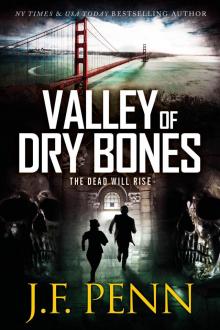 Valley of Dry Bones
Valley of Dry Bones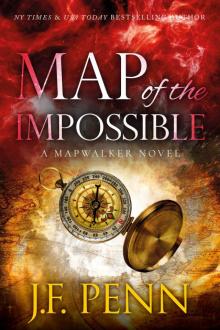 Map of the Impossible
Map of the Impossible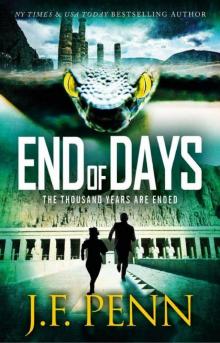 End of Days
End of Days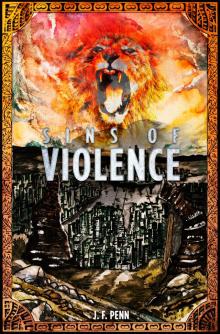 Sins of Violence
Sins of Violence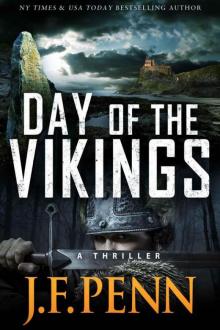 Day of the Vikings
Day of the Vikings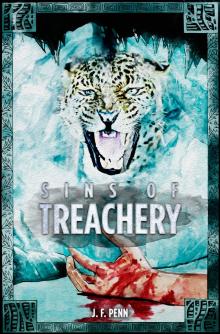 Sins of Treachery
Sins of Treachery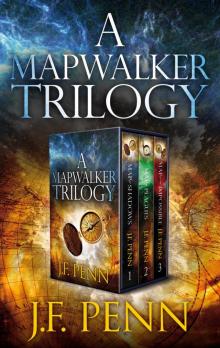 A Mapwalker Trilogy
A Mapwalker Trilogy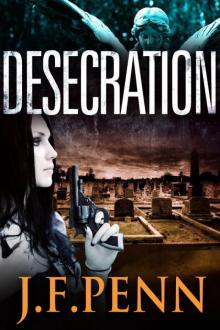 Desecration
Desecration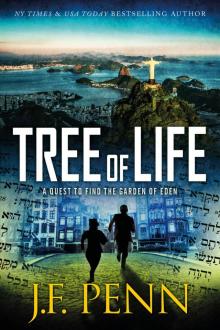 Tree of Life
Tree of Life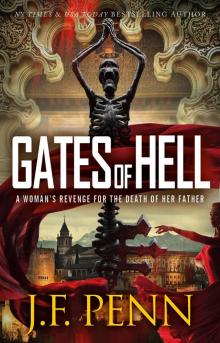 Gates of Hell
Gates of Hell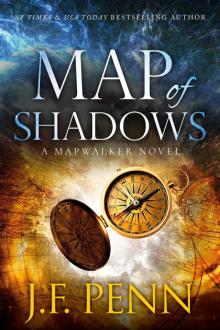 Map of Shadows
Map of Shadows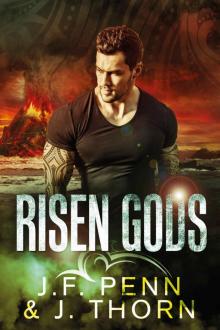 Risen Gods
Risen Gods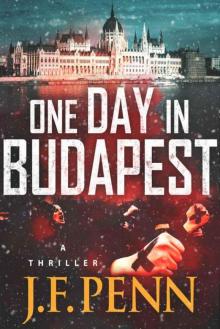 One Day In Budapest
One Day In Budapest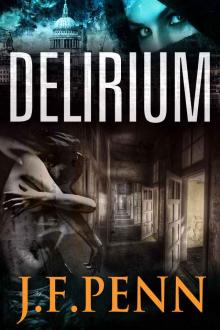 Delirium (London Psychic)
Delirium (London Psychic)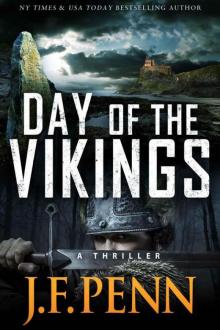 Day of the Vikings. A Thriller. (ARKANE)
Day of the Vikings. A Thriller. (ARKANE)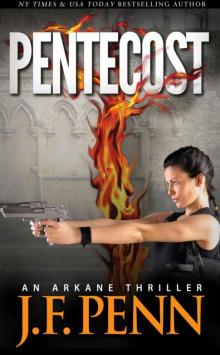 Pentecost. An ARKANE Thriller (Book 1)
Pentecost. An ARKANE Thriller (Book 1) Deviance (The London Psychic Book 3)
Deviance (The London Psychic Book 3)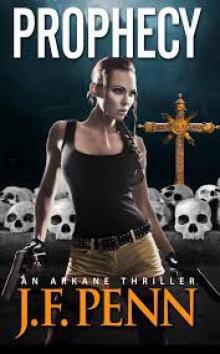 Prophecy. An ARKANE thriller. (Book 2)
Prophecy. An ARKANE thriller. (Book 2)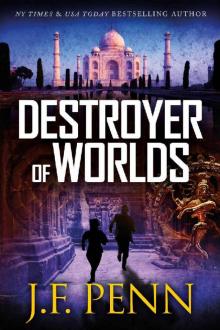 Destroyer of Worlds (ARKANE Book 8)
Destroyer of Worlds (ARKANE Book 8)